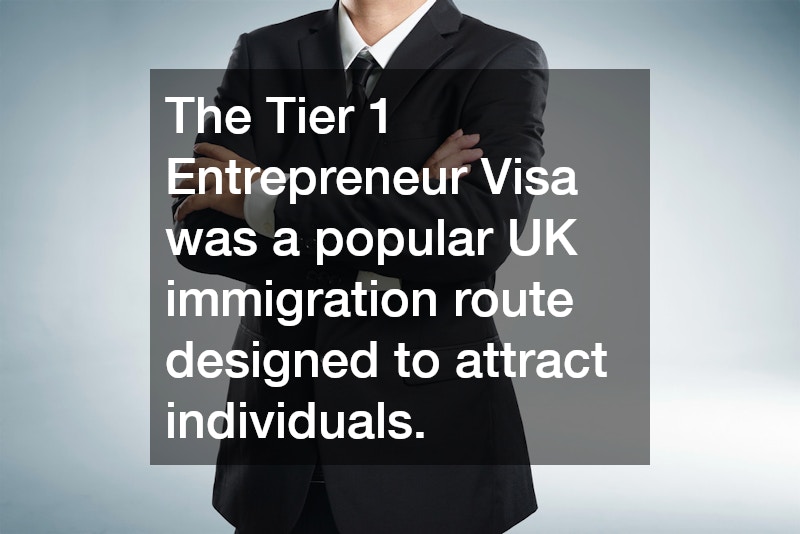
The Tier 1 Entrepreneur Visa was a popular UK immigration route designed to attract individuals looking to invest in and actively run a business in the United Kingdom. While the route is no longer available for new applicants, it’s still relevant for those seeking extensions or transitioning to other visa categories. This guide explores the essential details about Tier 1 Entrepreneur Visas, from eligibility requirements to navigating extensions and alternatives.
Understanding the Tier 1 Entrepreneur Visa
The Tier 1 Entrepreneur Visa was created to encourage business growth and innovation in the UK by inviting entrepreneurs to invest in the local economy. The visa allowed individuals from outside the European Economic Area (EEA) and Switzerland to start or take over a business in the UK.
Applicants needed to meet specific investment and operational requirements to qualify.
Although the Tier 1 Entrepreneur Visa category closed to new applications in March 2019, existing holders can still extend their stay or apply for indefinite leave to remain (ILR) if they meet the criteria. Those seeking similar opportunities now often consider the Innovator Visa, which has replaced the Tier 1 route for business-focused applicants.
Eligibility Criteria for Tier 1 Entrepreneur Visas
Meeting the eligibility criteria was crucial for obtaining a Tier 1 Entrepreneur Visa. Applicants had to demonstrate:
-
Access to Investment Funds
Applicants needed at least £200,000 in investment funds available for use in the UK. Alternatively, they could qualify with £50,000 if the funds were provided by a registered venture capital firm, UK government department, or seed funding competition. -
Business Viability
A strong business plan showcasing the viability and potential for growth was a critical requirement. The business had to contribute to the UK economy, often by creating jobs or introducing innovation. -
Genuine Entrepreneur Test
The Genuine Entrepreneur Test was introduced to assess the applicant’s intentions and ability to run a successful business in the UK. This involved interviews and providing evidence of business activities. -
Language Proficiency and Maintenance Funds
Applicants had to meet English language requirements and demonstrate sufficient maintenance funds to support themselves without accessing public funds. -
Job Creation
To qualify for extensions or ILR, entrepreneurs needed to create at least two full-time jobs for settled workers in the UK.
Extending Tier 1 Entrepreneur Visas
For those already holding Tier 1 Entrepreneur Visas, extensions are available if they continue to meet the required conditions. Key factors for successful extensions include:
- Demonstrating that the investment funds have been used as planned in the business.
- Showing evidence of job creation for settled workers in the UK.
- Proving active engagement in the business and compliance with reporting obligations.
Applications for extensions must be submitted before the visa expires, and it’s recommended to begin the process well in advance to avoid complications.
Transitioning to Indefinite Leave to Remain (ILR)
After five years in the UK under the Tier 1 Entrepreneur Visa, applicants may be eligible to apply for ILR, which allows them to settle permanently in the UK. Some individuals may qualify for accelerated settlement after three years if their business has created at least ten jobs or generated £5 million in revenue.
ILR applications require detailed documentation, including evidence of business success, job creation, and adherence to visa conditions. Upon approval, ILR grants individuals the right to live, work, and study in the UK without time restrictions.
Alternatives to the Tier 1 Entrepreneur Visa
Since the closure of the Tier 1 Entrepreneur Visa category, several alternatives have emerged for individuals seeking to establish a business in the UK. Key options include:
-
Innovator Visa
The Innovator Visa targets experienced entrepreneurs with innovative business ideas. Applicants must secure endorsement from an approved endorsing body and demonstrate that their business is viable, scalable, and innovative. The minimum investment requirement is £50,000. -
Start-Up Visa
The Start-Up Visa is suitable for early-stage entrepreneurs who need support to develop their business ideas. Like the Innovator Visa, this category requires endorsement from an approved body but does not have a minimum investment requirement. -
Sole Representative Visa
For individuals representing an overseas business planning to establish a branch or subsidiary in the UK, the Sole Representative Visa provides a viable route. -
Global Talent Visa
Entrepreneurs with exceptional talent or promise in fields such as technology, science, or arts may consider the Global Talent Visa, which allows individuals to work and innovate freely in the UK.
Benefits of Tier 1 Entrepreneur Visas
While the Tier 1 Entrepreneur Visa is no longer open for new applications, its benefits remain significant for those extending or transitioning. Key advantages include:
- Flexibility to Start or Take Over Businesses: Entrepreneurs could launch new ventures or take over existing businesses, fostering economic growth.
- Pathway to Settlement: The visa provided a clear route to ILR, allowing long-term residency in the UK.
- Family Inclusion: Dependents, including spouses and children, could accompany the visa holder and access education and healthcare.
Challenges of Tier 1 Entrepreneur Visas
The Genuine Entrepreneur Test and strict documentation requirements often posed challenges for applicants. Moreover, the need to demonstrate job creation and business sustainability required meticulous planning and execution. Despite these hurdles, many entrepreneurs successfully leveraged the visa to establish thriving businesses in the UK.
Working With Immigration Solicitors
Given the complexities of Tier 1 Entrepreneur Visas, working with experienced immigration solicitors is highly recommended. Solicitors can assist with preparing business plans, gathering documentation, and navigating interviews or extensions. Their expertise ensures compliance with requirements and maximizes the chances of a successful application or extension.
Although Tier 1 Entrepreneur Visas are no longer available for new applicants, they remain an important pathway for existing holders seeking extensions or ILR. Understanding the requirements and planning carefully are essential for success. For those exploring alternative routes, options like the Innovator Visa and Start-Up Visa offer opportunities to bring innovative ideas to the UK. Working with immigration professionals can help simplify the process and turn entrepreneurial dreams into reality.
.

